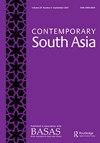组织斯利那加的谢赫环卫工人:从尊严政治到Pasmanda行动主义?
IF 0.8
3区 社会学
Q3 AREA STUDIES
引用次数: 1
摘要
摘要本文旨在了解克什米尔首府斯利那加主要属于谢赫种姓的环卫工人的集体动员。基于民族志实地调查和采访,我记录了两个组织——环卫工人工会和查谟和克什米尔Pasmanda Tabqajat联合会——如何追求尊严政治,以对抗谢赫传统上面临的历史和系统性歧视。我强调了这两个组织之间的差异。前者主要关注与工作相关的问题,而后者则试图在克什米尔背景下翻译Pasmanda主张的政治。在这个过程中,它努力在帕斯曼达种姓群体中实现政治团结。总的来说,这篇文章还表明,谢赫抵抗隐形的努力打破了克什米尔穆斯林人口只抗议占领的同质观念。本文章由计算机程序翻译,如有差异,请以英文原文为准。
Organising the Sheikh sanitation workers in Srinagar: from the politics of dignity to Pasmanda activism?
ABSTRACT This article seeks to make sense of the collective mobilisation of sanitation workers, who mainly belong to the Sheikh caste, in Kashmir’s capital Srinagar. Based on ethnographic fieldwork and interviews, I document how two organisations—the sanitation workers’ union and the All Jammu and Kashmir Pasmanda Tabqajat Federation—pursue a politics of dignity to counter the historical and systemic discrimination that the Sheikhs have traditionally faced. I highlight the differences between the two organisations. While the former mainly focuses on work-related issues, the latter seeks to translate the politics of Pasmanda assertion in the Kashmiri context. In this process, it struggles to bring about political solidarity across Pasmanda caste groups. Overall, this article also suggests that the Sheikhs’ endeavour to counter invisibilisation fractures the notion of a homogenous Kashmiri Muslim population protesting only against occupation.
求助全文
通过发布文献求助,成功后即可免费获取论文全文。
去求助
来源期刊

Contemporary South Asia
AREA STUDIES-
CiteScore
2.10
自引率
0.00%
发文量
82
期刊介绍:
The countries of South Asia - Bangladesh, Bhutan, India, Maldives, Nepal, Pakistan and Sri Lanka - are internally diverse and part of global flows of people, goods and ideas. Contemporary South Asia seeks to address the issues of the region by presenting research and analysis which is both cross-regional and multi-disciplinary. The journal encourages the development of new perspectives on the study of South Asia from across the arts and social sciences disciplines. We also welcome contributions to pan-regional and inter-disciplinary analysis. Our aim is to create a vibrant research space to explore the multidimensional issues of concern to scholars working on South Asia and South Asian diasporas in the postcolonial era.
 求助内容:
求助内容: 应助结果提醒方式:
应助结果提醒方式:


